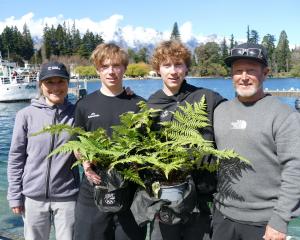"I was in the hotel room at Sky City in Auckland and was eating a Mars Bar," he said.
"There was a promotion going on and I could win a second Mars Bar if I found the right note inside the wrapper."
It was not what he expected, but Brodie found an appropriate message inside.
"It said you don't need brains, just luck."
Brodie (32) was runner-up in the young scientist category in this year's MacDiarmid Young Scientist of the Year Awards and he also won the future science and technology category.
He is completing a PhD in Biomechanics at Massey University and has developed a world-first system for measuring the precise movements of a skier while racing downhill.
He has pioneered a motion capture system that produces data that can help elite skiers go faster and potentially win more competitions by making more efficient use of gravity.
"There was a lot of hard work that went into it and I was very happy to win the award," Brodie said.
He said there was also a lot of luck involved when it came down to the final 20.
"I met one of the judges, who said he had read my abstract and he didn't know whether it was brilliant or complete rubbish," Brodie said. "But he gave it the benefit of the doubt."
Brodie is based in Wellington. He is a former speed skier, race coach and instructor as well as a graduate in engineering.
He has pioneered a system which tracks the movements of a skier using a network of lightweight sensors strapped to the body.
The fusion motion capture technology uses 15 motion sensors attached to the skier, producing data that can be used to adapt a skier's technique.
"Before I started this I worked as a ski instructor and as a ski race coach and on ski patrol in Japan," Brodie said.
"My research developed from my love of skiing. I wanted to do a PhD and thought it was important to do it on a subject I enjoyed. When it is all completed I will be called a doctor of skiing, and this is something I can chuckle about."
Although the system was designed for skiing, it could be used in any sport.
Its flexibility would make it suitable for sports where longer distances or difficult terrain make traditional camera-captured data impossible.
The world record for speed skiing is 260km an hour.
Brodie's fastest speed on the slopes is 150km.












